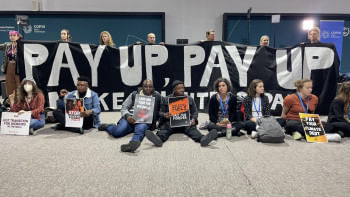Rohingya Refugees: More support needed as crisis growing: WB

The World Bank has said the Rohingya refugee crisis is growing at a rapid pace in Cox's Bazar and there is an urgent need to support the host communities to cope with the influx and to help those extremely vulnerable.
After visiting some Rohingya camps in Cox's Bazar yesterday, World Bank South Asia Vice President Annette Dixon praised the Bangladesh government and its people for sheltering and caring for the large number of Rohingyas fleeing violence in Myanmar, according to a WB statement.
She said the bank was ready to work with the government to help the host community and the displaced Rohingyas.
“The scale of the influx is enormous. As far as the eyes can see, lines after lines of shelters -- made of plastic sheets and bamboos -- stretched over the deforested hills. It is creating huge pressure on the infrastructure and services as well as on the water resources and the environment. When the monsoon approaches, the challenges with disease and natural disasters will increase.”
Meanwhile, Myanmar state media yesterday said the country was making final preparations to take back the first batch of Rohingyas, despite growing doubts about the plan among refugees and in the United Nations, reports Reuters.
Rakhine state Chief Minister Nyi Pu “insisted on completion of the finishing touches on buildings, medical clinics and sanitation infrastructures” during a visit to repatriation camps in the state on Friday, the Global New Light of Myanmar newspaper said.
It published a photo of his delegation standing by a long, wooden house that would be used to house returnees at the camp near the town of Maungtaw. A wire-mesh fence topped by barbed wire appears in the background of the photo.
Over 655,500 Rohingyas fled to Bangladesh after the Myanmar military cracked down in the northern part of Rakhine on August 25. The United Nations described the operation as ethnic cleansing of the Rohingya, which Myanmar denies.
Annette Dixon yesterday visited the registered and makeshift camps and spoke with Rohingyas and locals. She also visited registration centres, health and food distribution centres, children centres and women-friendly spaces.
While these efforts are helping the Rohingyas cope, they will need more support to rebuild their lives, according to the WB statement.
“The people and the government of Bangladesh have shown great generosity to the Rohingyas in their hour of need. As soon as the crisis broke, with the government, the local and international Non-Governmental Organisations [NGOs] and development partners extended support. This helped save thousands of lives.
“But the needs are much greater. If the government seeks help, we can mobilise more resources to address the needs of both the host communities and the Rohingyas in a way that will continue to benefit the locals after the Rohingyas leave,” she said.
The WB official concluded her five-day visit to Bangladesh yesterday.
REFUSING TO RETURN HOME
Rohingya refugees at the Kutupalong camp in Cox's Bazar are balking at going back until Myanmar can guarantee their safety, among other demands listed in a petition drawn up by camp leaders and shown to Reuters.
Even as Myanmar gets ready to start receiving the Rohingya next week, more of them are fleeing continued military operations in Rakhine, newly arrived refugees said.
More than 100 Rohingyas from Rakhine fled into Bangladesh and scores more were waiting to cross the Naf river, they said.
'CONCENTRATION CAMPS'
Rohingyas insurgents yesterday said the repatriation plan was "not acceptable" and "the Burmese [Myanmarese] terrorist government was deceitfully and crookedly offering Rohingyas to settle down in so-called temporary camps".
“Repatriated Rohingya refugees from Bangladesh will never be able to settle down in their own ancestral land and villages, rather than spending not only the rest of their lives but also the lives of their next generations to come in those concentration camps,” the Arakan Rohingya Salvation Army (ARSA) said in a statement on Twitter.
Myanmar has said it would build a transit camp that can house 30,000 returnees before they are allowed to return to their “place of origin” or "nearest to their place of origin."
Paul Vrieze, the UN Refugee Agency (UNHCR) spokesman in Myanmar, cautioned that the returnees must not be rushed out of Bangladesh “without the informed consent of refugees or the basic elements of lasting solutions in place”.
“Further measures are also required to ensure safe, voluntary and sustainable repatriation of refugees to their places of origin and to address the underlying root causes of the crisis,” he said.
The UNHCR, which is helping to administer the refugee camps, is not involved in the repatriation exercise between Bangladesh and Myanmar.


 For all latest news, follow The Daily Star's Google News channel.
For all latest news, follow The Daily Star's Google News channel. 








Comments